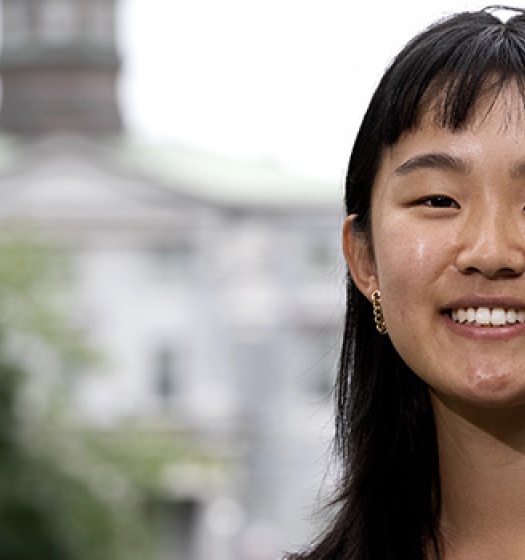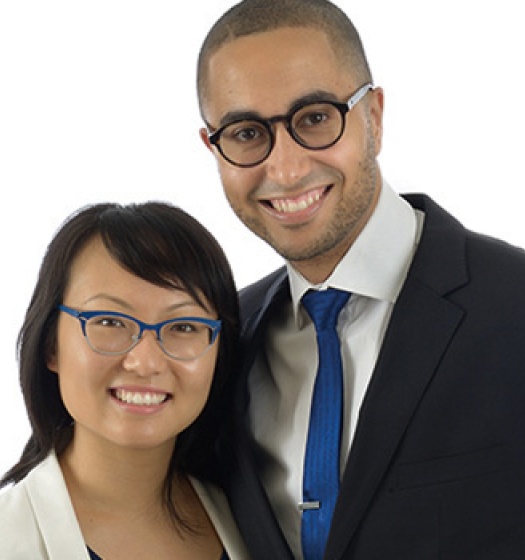In September, McGill welcomed the first recipients of the McCall MacBain Scholarships – 20 aspiring innovators, community builders, and leaders who embarked on master’s and professional degree programs buoyed by a full scholarship.
Meanwhile, the Chancellor's Third Century Challenge Fund has also sparked a flurry of new bursaries at McGill.
The two initiatives – championed by McGill Chancellor John McCall MacBain, BA’80, LLD’14, and his predecessor, Chancellor Emeritus Michael Meighen, BA’60, LLD’12, respectively – are boosting student support in McGill’s third century and fostering excellence and inclusivity.
Being part of the inaugural cohort of McCall MacBain Scholars has “meant the world” to Grace Ma, a first-year Law student from Winnipeg. “I am settling in a new city and undertaking a new academic journey with the support of the scholarship community, and relieved of a large financial burden,” says Ma, who notes the scholars “really clicked” from the get-go.
“I have also really appreciated all the leadership and personal development opportunities the scholarship provides us through guided sessions, mentorship, and coaching.”

Grace Ma
John McCall MacBain and Dr. Marcy McCall MacBain established the scholarships with a historic $200-million gift to the University in 2019. In addition to the 20 McCall MacBain Scholars who were selected to receive full scholarships in April 2021, 55 other promising candidates who were identified during the search process were offered entrance awards of $5,000 or $10,000.
For McCall MacBain Scholar Kasem Alhaeik, whose family moved back to Canada from his native Syria in 2012, the scholarship allows him to focus on his master’s in Political Science with an option in Development Studies. He’s passionate about studying aid and working in international cooperation. Growing up in Syria, “I saw these NGOs doing great work, but I also saw a lot of failures, a lot of things that we all knew were wrong, but nobody was changing [them],” he says.
Paired with a mentor (Nahlah Ayed, host of CBC Radio’s IDEAS and former foreign correspondent in the Middle East) as well as a faculty advisor, Alhaeik also values the program’s enriching leadership sessions.
One session in January focused on conflict resolution and receiving feedback. The topics are interesting, and scholars start to gain more understanding about “how we solve big world issues but also inter-personal ones too, and really build those skills for the future,” says McCall MacBain Scholar Caroline Merner. She chose to do her master’s at the Max Bell School of Public Policy.
“I was interested in learning more about how to build the foundations of climate policy. And how to influence decision-makers to be more ambitious on climate change,” says Merner, who co-founded Youth4Nature, a non-profit that mobilizes youth on nature and climate action.
She calls it “an incredible honour” to be part of the cohort.
“This group is so diverse in backgrounds and also in interests. We get to meet weekly and the type of conversations we have and the opportunities for discussing how we see the world and how we want to make changes has been pretty inspiring for me.”
***
The Chancellor's Third Century Challenge Fund, created by Chancellor Emeritus Meighen with a $2.5-million gift in 2019, included matching funds to encourage others to launch entrance bursaries for students in financial need. Donors rose to the challenge, contributing nearly $3 million and establishing 48 student awards that span all faculties. Two more bursaries were created thanks to collective giving on McGill24.
Chafik Hamad, MBA’15, is one of the donors who was inspired to create an award. He set up the RAFAH Bursary in his mother’s memory with an eye toward helping students who face systemic barriers to education such as refugees and displaced people. RAFAH, his mother’s name, refers to well-being and prosperity in Arabic, which is what Hamad hopes to bring about among student recipients.
The Cadet Foundation Bursary, also established with the help of the Challenge Fund, aims to help support and train more Black physicians.
Nicolas Cadet, MDCM’12, an ophthalmologist and oculoplastic surgeon, launched the Cadet Foundation with his wife, Ji Wei Yang, MDCM’12, and his parents – Sylvie, a physician, and Robespierre, a pastor. Cadet praised the Chancellor’s Third Century Challenge Fund initiative. “Every single bursary is going to have its own impact that is amplified by the Chancellor’s contribution. I think that’s really something fantastic.”

Ji Wei Yang and Nicolas Cadet
Cadet hopes word spreads about the Cadet Foundation Bursary because “many people from Black and marginalized communities don’t really feel as if they’re welcome in medicine necessarily or that medicine is an option for them.”
“I just want them to know that if it’s their dream and they give it their all, that it’s possible to be a physician.”

